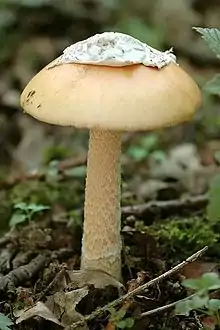Amanita subjunquillea
Amanita subjunquillea, also known as the East Asian death cap is a mushroom of the large genus Amanita, which occurs in East and Southeast Asia. Potentially deadly if ingested, it is closely related to the death cap A. phalloides.
| East Asian Death cap | |
|---|---|
| Scientific classification | |
| Kingdom: | Fungi |
| Division: | Basidiomycota |
| Class: | Agaricomycetes |
| Order: | Agaricales |
| Family: | Amanitaceae |
| Genus: | Amanita |
| Species: | A. subjunquillea |
| Binomial name | |
| Amanita subjunquillea | |
| Amanita subjunquillea | |
|---|---|
float | |
| gills on hymenium | |
| cap is convex | |
| hymenium is free | |
| stipe has a ring and volva | |
| spore print is white | |
| ecology is mycorrhizal | |
| edibility: deadly | |
Initially little reported, the toxicity of A. subjunquillea has been well established; a study in Korea revealed it to have similar effects to A. phalloides, namely delayed gastrointestinal symptoms, hepatotoxicity, and a 12.5% mortality.[1] The species killed five people out of six who ingested them in Hebei, China in 1994.[2]
An all-white variety, Amanita subjunquillea var. alba is known from southwestern China, Japan, and Northern India.
References
- (in Korean) Rho HJ, Kim JH, Kang HR, Lee MK, Hyun SH, Kang YM, Lee JM, Kim NS (2000)"Clinical manifestations of Amanita subjunquillea poisoning" Korean J Med. 58(4):453–461
- 云南野生蘑菇中毒防治手册 2011.05
This article is issued from Wikipedia. The text is licensed under Creative Commons - Attribution - Sharealike. Additional terms may apply for the media files.
